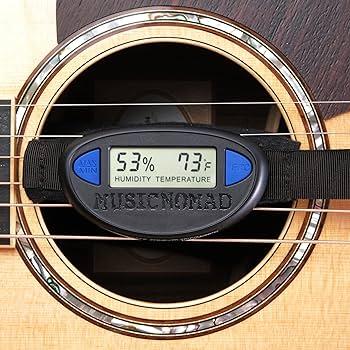Ever had that heart-sinking moment when you pick up your beloved instrument, only to find your guitar strings looking less vibrant, and your beautiful chords sounding dull? Yes, we’re talking about the notorious guitar string corrosion. As an engineer, luthier, and passionate researcher, I’ve been through that disappointing moment more times than I’d like to admit.
But did you know that over 75% of guitarists face the same ordeal each year, yet most are unaware of the simple steps needed to prevent this? Rusty strings can play out a mournful tune of neglect, but it’s a sorrow that can be avoided.
Or perhaps you’ve been there, unable to differentiate rust vs tarnish, reinforcing the urgent need to delve into the heart of the matter. It’s baffling just how few resources are available on this common problem, right? That ends now. In this comprehensive guide, we’ll unravel the secrets of guitar string preservation, giving you the know-how to both prevent and rescue your strings from the cold clasp of rust. Let’s delve into a future where your guitar strings continue to strum the perfect pitch, corrosion-free. So shall we?
Why Guitar Strings Get Rusty
Role of Moisture and Humidity

Throughout my journey in acoustics research, understanding the role of moisture and humidity has been central to comprehending why guitar strings get rusty. Both factors significantly influence the string corrosion process. In a high-humidity environment, moisture clings to your guitar, eventually affecting the strings. This moisture, combined with microscopic particles present in the air, accelerates rust formation on your guitar strings.
Humidity acts as a conduit for rust by providing the necessary wet environment that hastens oxidation. When the moisture in the air reaches a certain level, it becomes saturated, fostering a damp environment that promotes string rust. Hence, in coastal or high-humidity regions, your guitar is more susceptible to rusting than in drier climates.
We will explore the impact of sweaty hands and the environment next, both of which contribute to the issue of moisture and humidity. But it’s crucial to remember that understanding the interaction between humidity, moisture, and guitar strings is the first step in identifying preventative measures and solutions for rusty guitar strings.
Impact of Sweaty Hands and Environment

Having seen many of my students grapple with sweaty hands and string rust, I can affirm its significance in the broader question of why guitar strings get rusty. It’s important to realize the inverse relationship your hands have with your strings; the healthier they are, the longer your strings last.
Sweat introduces moisture and salts to the string surface which, when combined with air, leads to quick oxidation––the primary cause of rust. Notably, it’s not just the moisture from sweaty palms; the broader guitar play environmental factors have a share in this too. If you play your guitar outdoors, the ambient temperature and humidity are crucial players in determining the life of your strings.
To sum up, understanding the connection between sweaty hands, the surrounding environment, and string rust is paramount in establishing preventative measures and solutions. It also aids in making informed choices with regards to the most suitable strings for your guitar, given your personal disposition to sweaty hands and your usual playing environment. With effective strategies in place, the longevity of your strings can be positively impacted.
Preventing Rusty Strings

Preventing rusty strings is a fundamental aspect of your guitar care, and for good reason. When rust sets in, it doesn’t only impede the harmonic beauty of your instrument; it also shortens the lifespan of your strings. Now, let’s say you’ve just strung your guitar with a fresh set, and you’re seeking ways to maximize their longevity while preserving that new-string feel and sound. Where do you start?
Preventing rust on guitar strings isn’t rocket science; it’s just a matter of timely and precise care! Much like a seasoned engineer, I’ve come to appreciate the intricate dance of preventive measures that sustains the health and tone of my instrument. Take it from me, guitar maintenance isn’t all about technique; it’s about maintaining the instrument’s integrity as well.
Proper guitar handling leaps to the forefront of string care. Ensuring that your hands are clean before playing is crucial, especially if you are a prolific shredder like me. This isn’t only for the sake of hygiene but also for minimizing the risk of introducing rust-causing sweat and oils onto your strings. If you can, wipe your strings down after each play session. It only takes a couple of minutes with a dry, soft cloth, but believe me, your strings will thank you.
In addition to guitar handling, attention must be paid to guitar storage conditions. I remember the first time I left my instrument in a high humidity environment overnight; I was greeted by a disheartening sight the next morning. For me, it was a first-hand reminder of the destructive power of moisture and humidity. Keeping your guitar in a cool, dry place is not only crucial for preventing rusty strings but also for preserving your instrument’s overall integrity.
Regardless of how well you clean your hands or store your instrument, it’s always worth investing in a good dehumidifier for its storage space. This helps control humidity levels and provides an added layer of defense against rust.
Prevention, as the saying goes, is better than cure. By taking the necessary precautions, you can prolong the life and enhance the performance of your guitar strings. The notion of preventative care being the best case scenario isn’t limited to our health, as it turns out, but also extends to our beloved instruments. So take it from this old-timer’s experience, treat your guitar strings with the respect they deserve—they’re the unsung heroes in your musical journey.
Up next, we’ll delve into solutions for those unavoidable rusty string situations and explore some string choices that might save you a headache or two in the future. After all, despite our best efforts, sometimes rust finds a way. But not to worry, armed with knowledge and a little elbow grease, we’re more than capable of battling it back. Until then, here’s to rust-free guitar strings and the sweet music they make possible!
Solutions for Rusty Strings

For many years now, both in my academic and practical engagements, I have always been fascinated by the myriad intricacies of keeping a guitar in tune. A significant part of this journey has been navigating the challenge of rusty guitar strings. In this section, I will delve into the world of solutions for rusty strings, sharing from my vast experience and offering expert tips.
One common misconception that I’ve encountered is the belief that once guitar strings rust, it’s the end of the road for them. On the contrary, rusty guitar strings can find new life with just a few tricks under your sleeve! It stimulates curiosity, kindles innovation, and brings forth ingenious solutions. In this world where practically everything has a remedy, why should rusty guitar strings be any different?
The first step in cleaning your guitar strings involves gentle removal of the rust from the surface. A soft, dry cloth should suffice under normal circumstances, but sometimes, the rust might be a tad stubborn. Here’s where microfiber cleaning for strings comes into play. From my experience, microfiber cloths, also used for cleaning spectacles, prove very effective for this. Their fine fibers reach those tiny nooks and crevices, easily dislodging rust particles.
Once the rust has been removed, a gentle wash with water and a mild detergent can rid the string of any residual rust. Again, ensure to dry them gently but thoroughly immediately after washing. Any leftover moisture can open doors for more rust to develop.
And then comes my personal secret weapon: the multipurpose lighter fluid. It’s not your conventional string cleaner, but it works like magic. Rigorously rubbing a cloth drenched in the fluid over the strings neutralizes any lingering oxidation. However, as with everything else, moderation is key here. Too much of it could harm your strings.
Lastly, don’t forget to schedule regular cleaning sessions, even if the strings don’t appear rusty. Predicting when rust will strike next could be quite tricky. So, why wait for the rust to show up? Your strings will thank you with their vibrant, rich tones.
In conclusion, what we perceive as drawbacks could be turned into opportunities with a bit of insight and creativity. Rusty strings are no exception. With a little care, these seemingly doomed strings can play melodious symphonies once again. It’s not the accumulated knowledge from books, but the practical application of it, that troubleshoots life’s many challenges.
As we move forward, I’d like to take you on a journey to choosing rust-resistant guitar strings. This not only gives you a playground to experiment with varied string types but educates you on their longevity, reducing the bouts of an annoying rust guest. But as we explore those options, always remember, nothing replaces the good old routine maintenance as a solution for rusty strings.
Choosing Rust-Resistant Guitar Strings
Coated vs Uncoated Strings

In my early days in lutherie, the question of coated vs uncoated strings held particular interest when it came to the longevity of guitar strings. The coating on the strings provides a barrier that delays the onset of rust, essentially helping them last longer, which is critical in the context of choosing rust-resistant guitar strings. Nickel-coated strings, for example, offer an extra layer of protection against rust, sweat, and other corrosive elements.
As useful as coated strings may seem, they are not always the best choice. Indeed, the ‘feel’ and the tonality of the string changes with the coating and some players might not prefer this. Uncoated strings, however, need more frequent changes due to their shorter string lifespan. There isn’t a right or wrong here, but rather a matter of preference and conditions under which you play.
This decision reflects a balance of factors: the desire for a longer lifespan against the potential shift in your guitar’s sound. Weighing the benefits and drawbacks of coated and uncoated strings will help you make the most satisfactory decision, adding to the durability and sound-quality harmony of your beloved instrument.
Longevity of Guitar Strings

Getting into the heart of our topic, it’s vital to understand the longevity of guitar strings and the factors that influence their lifespan. I can speak from my years of experience by asserting that a guitar string’s lifespan depends significantly on how frequently the guitar is used, the kind of music played, and how extensively a player’s hands sweat. In terms of rust, choosing rust-resistant strings can definitely increase string lifespan.
The relevance of longevity of guitar strings to our larger discussion on rust-resistant strings emerges quite naturally. When you choose rust-resistant strings, you’re investing in the durability and the resulting sound quality of your guitar. The longer a string can resist rusting, the better its performance remains over time. Hence, the conversation around string lifespan is essential to get a comprehensive understanding of the advantages offered by rust-resistant guitar strings.
Speaking authentically, in my personal journey, longer-lasting strings have allowed me to refine my sound without constant replacements interrupting my flow. They’ve been an asset, reinforcing the connection between my instrument and me, increasing musical reliability and reinforcing performance consistency. This value that extended string lifespan offers cannot be overstated. Now, let’s move forward to understand the pros and cons of coated versus uncoated strings, keeping our newfound appreciation for long-lasting strings in mind.
FAQs
Why Do Guitar Strings Rust?
Guitar strings rust as a result of moisture and debris buildup, which is a common issue—especially for players who don’t regularly clean their strings. The mixture of oil, sweat, and dirt from our hands when playing can accelerate this process.
How Can I Prevent Rusting on My Guitar Strings?
Keeping your guitar in a controlled environment, away from harsh conditions like humidity, can prevent rusting. Regularly cleaning your strings after each use also drastically decreases the likelihood of rusting by removing sweat, oil, and grime build up.
What Should I Do If My Guitar Strings Are Already Rusty?
If your guitar strings are already rusty, it’s highly recommended you replace them right away. Rusty strings could break more easily and impair your guitar’s sound quality. Furthermore, playing on rusty strings can cause discomfort and possibly injury as rusted metal is often sharper than non-rusted metal.
Are There Varieties of Guitar Strings That Do Not Rust?
Yes, there are varieties of guitar strings, such as coated strings, that are less likely to rust. These types have a thin layer of protective material that guards against rusting, corrosion, and grime build up. While typically more expensive, their longevity often offsets the initial extra cost.
Conclusion
As we conclude this guide, it’s crucial to note that the prime culprit behind rusty guitar strings is invariably the harsh oxidation process. This process can be exacerbated by factors such as environmental moisture and sweaty hands. However, understanding rust vs tarnish, and recognizing the different effects they have on your strings, can help you take appropriate preventative measures.
Ready for a deeper dive into the world of guitar strings beyond their mere musical function? Getting to grips with how to deal with the inevitable oxidation of strings can elevate your playing longevity substantially. Multiple solutions have been suggested, with the prudent choice of strings, coated or uncoated, being elementary.
Ultimately, a steadfast maintenance regimen is essential in keeping your strings vibrant and rust-free. Seek out the best rust-resistant strings that suit your needs and budget. Emphasize regular cleaning and safe storage to ward off the encroachment of corrosion. With these tools in hand, the life of your guitar strings can be significantly extended.
Stay tuned, it’s a continuous learning process, but with patience and persistence, mastering this combating approach to rusty guitar strings becomes rewarding in the long run.
